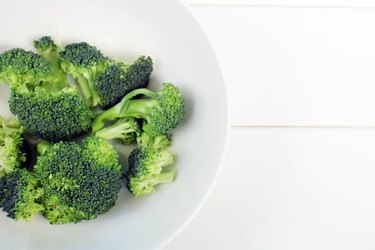
Sugar is a naturally contained, or processed carbohydrate your body needs and uses for energy. While naturally occurring sugars are found in unrefined foods, processed sugars are added to a product. The addition of processed sugars assists in enhancing the products flavor in addition to improving the color and texture while helping preserve the integrity of the food item.
Forms of Sugar
Video of the Day
Naturally occurring sugars, or sugars contained within unprocessed foods, are considered intrinsic. The most common intrinsic sugars -- glucose, fructose, lactose and sucrose -- are commonly found in fruits and vegetables, which are the staples of a healthy diet. Processed sugars, or sugars that are added to food, are considered extrinsic. Extrinsic sugars include syrups, such as honey and those used in soft drinks and artificial sweeteners.
Video of the Day
Sources of Intrinsic Sugars
Fruits and vegetables are both common sources of intrinsic sugars. Most fruits contain a combination of glucose, sucrose, and fructose as a large majority of their sugar content, a small variety of fruits also contain galactose and maltose. Vegetables, while they do contain some degree of intrinsic sugars, the amount is considerably lower compared to fruits. Vegetables primarily contain higher levels of sucrose then any other intrinsic sugar. Milk also is a product that contains some levels of intrinsic sugars in the form of maltose.
Health Effects
Sugar in appropriate amounts are used by the body as a source of fuel and is required to maintain a healthy metabolism. Sugar in large quantities, whether intrinsic or extrinsic, are not useful to the body. Excess amounts of sugars add no nutritional benefit and unnecessarily increase total daily calories consumed. Too many calories can lead to weight gain and obesity and the deleterious effect excessive weight has on the body. In addition, large amounts of sugar can cause elevations in your triglyceride levels and can negatively effect the health of your teeth, resulting in significant cavities and decay.
Recommendations
The USDA recommends that you choose foods with little added sugars or sweeteners for a balanced, healthy diet. According to the American Heart Association, intrinsic sugars should be limited to at least half of your daily intake of carbohydrates and extrinsic sugars should be limited to no more then half of your maximum daily amount. There are many ways that you can reduce the intake of sugar and still maintain a satisfying diet. Look for sugar-free items or foods with low-calorie options. Add fruits or vegetables to your meals, taking advantage of the intrinsic sugars while not adding excess calories with sweeteners. Try spices instead of sugars to add extra flavor without adding extra calories. Having the ability to recognize what is considered a sugar, and which types are better for you, can help you limit your consumption to improve your diet and health.